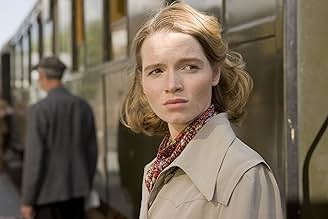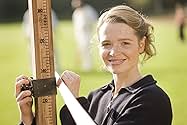In den Tagen vor den Olympischen Spielen 1936 hängt das Schicksal der Hochspringerin Gretel Bergmann davon ab, ob eine jüdische Sportlerin in die deutsche Olympiamannschaft aufgenommen werde... Alles lesenIn den Tagen vor den Olympischen Spielen 1936 hängt das Schicksal der Hochspringerin Gretel Bergmann davon ab, ob eine jüdische Sportlerin in die deutsche Olympiamannschaft aufgenommen werden kann oder nicht.In den Tagen vor den Olympischen Spielen 1936 hängt das Schicksal der Hochspringerin Gretel Bergmann davon ab, ob eine jüdische Sportlerin in die deutsche Olympiamannschaft aufgenommen werden kann oder nicht.
- Auszeichnungen
- 2 Gewinne & 1 Nominierung insgesamt
Handlung
WUSSTEST DU SCHON:
- WissenswertesSome of the newsreel footage shown in a theatre during the Games is actually from Leni Riefenstahl's documentary film "Olympia", which was not released until 1938.
- PatzerIn real iife, "Marie" was actually Intersex and had been raised as a girl. He was legally declared to be a man by a German court, and his first name was changed to Hermann. He was also permanently barred from sports and his records and medal were stricken.
- VerbindungenReferenced in La noche de...: La noche de... Berlin 36 (2019)
Ausgewählte Rezension
With Singapore hosting our first Olympics event, albeit the inaugural Youth Olympic Games, perhaps it is apt for us to reflect upon the importance of the values and spirit promoted by the Games toward the notion of Swifter, Higher, Stronger, because not always were the Games free from influence other than sports excellence and the triumph of human determination and to see how perseverance and training paid off.
Based on a true story and set in 1936 Berlin, where Germany is on the cusp of holding their first Olympic Games in the summer, Berlin 36 tells of how politics managed to get embroiled into sports, no thanks to Adolf Hitler sweeping into power some three years before, and taking the Games as a platform to further his party's propaganda, extending his prejudice and discrimination toward the Jews in not allowing them to compete under the German flag. This of course does not bode well for the United States, and to appease them in order to stave off a potential boycott by the US and her allies, the Germans had to pass off a show to rescind their decision for the Jews exclusion. This means that the world's best high jumper of the time, the German Jew Gretel Bergmann (Karoline Herfurth) had to be "persuaded" to return to the Fatherland for representation and competition.
This drama directed by Kasper Heidelbach not only tackles the issue of the kind of extreme discrimination and belief in the superiority of the Aryan race, but poses a more thought- provoking examination at the macro level issues as faced by Gretel in tackling and addressing prejudices from all angles, being the lone athlete in a training village, treated like an outcast by fellow citizens. She finds it near impossible to show love and pride in being able to represent her country that doesn't love her back, what more to earn honours for it? Like any authoritarian regime, they function on the basis of threats not only to self but family, and is able to shape outcomes as desired through silence, and misdirection.
And the worst was of course in hand-picking Marie Ketteler (Sebastian Urzendowsky) to become Gretel's chief rival both in training and the eventual competition, not that there was any intent anyway to allow Gretel to make it all the way to the Olympics proper. Marie is seemingly able to challenge Gretel one on one, which is quite expected should you read the synopsis or know the background of Marie's deep, dark secret. Like Gretel, Marie was also forced to be in the limelight to do as told, and deviations to the established plan was going to be frowned upon severely. What once began as a cold rivalry soon paves the way toward firm friendship, as both Gretel and Marie find themselves under the same circumstances of being played as puppets, and both harbour hopes of somehow being able to break away from the bonds that shackle them.
It is precisely the chemistry between the cast, especially the leads, that pull this film off, in providing an engaging and engrossing premise for their cooperation/competition. Production values for this historical story is kept high, and also provided room to boast some fantastically designed sets and effects used to recreate 1930s Germany, as well as the impressively recreated Stadium used for the Games featuring huge Zeppelins flying overhead. These money shots at the finale will put you smack in the middle of the propaganda festivities where important decisions will be made by the leading two athletes, and one can imagine just how the actual mood and feel would be like on the streets and at the venue.
I have a penchant for films about sports from the yesteryears, because when documented and portrayed accurately, allow the modern audience a glimpse into how the sport of today have evolved from time past. The high jump here is slightly different from the techniques and styles employed now, so that should pique your interest enough as one of the points to watch this film. There may be some quarters grumbling about how much the YOG budget is costing us, but let's not mix politics with this platform for our youths to have a go and competing with their peers representing the best from countries around the world.
Based on a true story and set in 1936 Berlin, where Germany is on the cusp of holding their first Olympic Games in the summer, Berlin 36 tells of how politics managed to get embroiled into sports, no thanks to Adolf Hitler sweeping into power some three years before, and taking the Games as a platform to further his party's propaganda, extending his prejudice and discrimination toward the Jews in not allowing them to compete under the German flag. This of course does not bode well for the United States, and to appease them in order to stave off a potential boycott by the US and her allies, the Germans had to pass off a show to rescind their decision for the Jews exclusion. This means that the world's best high jumper of the time, the German Jew Gretel Bergmann (Karoline Herfurth) had to be "persuaded" to return to the Fatherland for representation and competition.
This drama directed by Kasper Heidelbach not only tackles the issue of the kind of extreme discrimination and belief in the superiority of the Aryan race, but poses a more thought- provoking examination at the macro level issues as faced by Gretel in tackling and addressing prejudices from all angles, being the lone athlete in a training village, treated like an outcast by fellow citizens. She finds it near impossible to show love and pride in being able to represent her country that doesn't love her back, what more to earn honours for it? Like any authoritarian regime, they function on the basis of threats not only to self but family, and is able to shape outcomes as desired through silence, and misdirection.
And the worst was of course in hand-picking Marie Ketteler (Sebastian Urzendowsky) to become Gretel's chief rival both in training and the eventual competition, not that there was any intent anyway to allow Gretel to make it all the way to the Olympics proper. Marie is seemingly able to challenge Gretel one on one, which is quite expected should you read the synopsis or know the background of Marie's deep, dark secret. Like Gretel, Marie was also forced to be in the limelight to do as told, and deviations to the established plan was going to be frowned upon severely. What once began as a cold rivalry soon paves the way toward firm friendship, as both Gretel and Marie find themselves under the same circumstances of being played as puppets, and both harbour hopes of somehow being able to break away from the bonds that shackle them.
It is precisely the chemistry between the cast, especially the leads, that pull this film off, in providing an engaging and engrossing premise for their cooperation/competition. Production values for this historical story is kept high, and also provided room to boast some fantastically designed sets and effects used to recreate 1930s Germany, as well as the impressively recreated Stadium used for the Games featuring huge Zeppelins flying overhead. These money shots at the finale will put you smack in the middle of the propaganda festivities where important decisions will be made by the leading two athletes, and one can imagine just how the actual mood and feel would be like on the streets and at the venue.
I have a penchant for films about sports from the yesteryears, because when documented and portrayed accurately, allow the modern audience a glimpse into how the sport of today have evolved from time past. The high jump here is slightly different from the techniques and styles employed now, so that should pique your interest enough as one of the points to watch this film. There may be some quarters grumbling about how much the YOG budget is costing us, but let's not mix politics with this platform for our youths to have a go and competing with their peers representing the best from countries around the world.
- DICK STEEL
- 1. Aug. 2010
- Permalink
Top-Auswahl
Melde dich zum Bewerten an und greife auf die Watchlist für personalisierte Empfehlungen zu.
Details
- Erscheinungsdatum
- Herkunftsland
- Sprachen
- Auch bekannt als
- Stille Sieger
- Drehorte
- Bochum, North Rhine-Westphalia, Deutschland(City Hall)
- Produktionsfirmen
- Weitere beteiligte Unternehmen bei IMDbPro anzeigen
Box Office
- Weltweiter Bruttoertrag
- 354.980 $
Zu dieser Seite beitragen
Bearbeitung vorschlagen oder fehlenden Inhalt hinzufügen


















